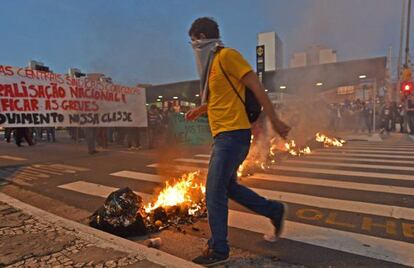São Paulo metro strike set to mar World Cup opening ceremony
Police use tear gas to disperse crowd blocking main city street as protests rage on

Attending the opening game of the Brazil World Cup at the Itaquerão stadium in São Paulo on Thursday could become a torturous ordeal for thousands of soccer fans. Three days before Brazil faces Croatia in the first match of the tournament, demonstrations in São Paulo continue apace. On Monday morning, the police used tear gas to disperse protestors who had cut off Rua Vergueiro – one of the most important streets in the financial district – according to Agence France-Presse. As 70 workers walked into the main train station to provide basic services for the day, they were greeted with smoke bombs, union leader Altino Melo dos Prazeres told the news agency.
On Sunday, metro workers held a meeting and decided to prolong the strike that has paralyzed the subway since last Thursday. The stoppage is affecting nearly four million people and complicating movement around the city just three days before the tournament kicks off. On the first day of the strike, downtown São Paulo – already known for its colossal traffic jams – experienced 239 kilometers of gridlock. The city was almost at a complete standstill.
This is a small problem. If there is no metro, then go by bus or by car” Marco Polo del Nero, president of the Brazil soccer federation
The workers chose to remain on strike despite the Regional Labor Tribunal’s unanimous decision to rule the walkout illegal. The court also raised the fine for failure to provide basic services from €30,000 to €150,000. Only the metro lines operated by private companies are working, but the red line that serves the Itaquerão stadium is publicly run. The express train that links the city center to the stadium area may also be stopped.
These issues could worsen and eventually lead to a general strike. “Ninety percent of workers support our demands,” one union leader said at Sunday’s meeting. Metro operators also said other social movements and unions had shown their support for the stoppage.
Union leaders and Metro de São Paulo were set to hold a meeting on Monday afternoon that will be a decisive factor in deciding the course of the conflict. Workers are asking for a 12.2 percent increase in salaries but the company is only offering an 8.7 percent raise. The entire city is following the negotiations. At the end of Sunday’s meeting, one worker overcame the shouts and screams in the room to say: “As soon as you leave here, you will start to hear that we have to end the strike, that there is a lot at stake for the World Cup. Do not get discouraged. What’s at stake here – more than the World Cup, Neymar and Fifa, are our lives and those of the workers.”
Marco Polo del Nero, the president of the Brazilian soccer federation, said he was not worried that the main train station serving the stadium may be closed next Thursday. “This is a small problem. If there is no metro, then go by bus or by car. There are always alternatives.”
This strike is an expression of many Brazilians’ lukewarm feelings – if not total dissatisfaction – towards the country’s hosting of the World Cup. Despite the nation’s love of soccer, fans are not showing the enthusiasm they once expressed: there are fewer decorations on the streets, fewer flags flapping in the windows, and in general less of the euphoric party atmosphere the championship once inspired.
Translation: Dyane Jean François
Tu suscripción se está usando en otro dispositivo
¿Quieres añadir otro usuario a tu suscripción?
Si continúas leyendo en este dispositivo, no se podrá leer en el otro.
FlechaTu suscripción se está usando en otro dispositivo y solo puedes acceder a EL PAÍS desde un dispositivo a la vez.
Si quieres compartir tu cuenta, cambia tu suscripción a la modalidad Premium, así podrás añadir otro usuario. Cada uno accederá con su propia cuenta de email, lo que os permitirá personalizar vuestra experiencia en EL PAÍS.
¿Tienes una suscripción de empresa? Accede aquí para contratar más cuentas.
En el caso de no saber quién está usando tu cuenta, te recomendamos cambiar tu contraseña aquí.
Si decides continuar compartiendo tu cuenta, este mensaje se mostrará en tu dispositivo y en el de la otra persona que está usando tu cuenta de forma indefinida, afectando a tu experiencia de lectura. Puedes consultar aquí los términos y condiciones de la suscripción digital.








































